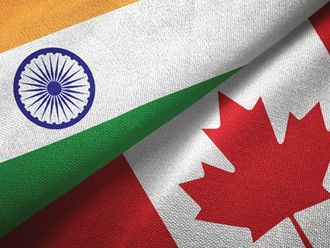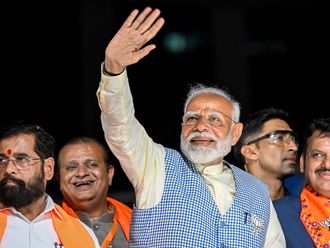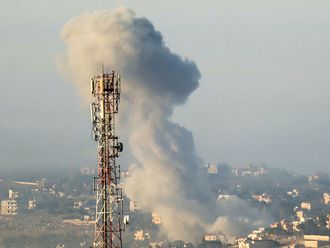Six years since the US-led invasion, it is clear that Iraq's neighbours can increase the chances of long-term settlement.
These countries include four large and powerful ones, each with a history of intervention in, and conflict with, Iraq: Turkey, Iran, Saudi Arabia and Syria. None of these claims any Iraqi territory, nor are they, in any serious way, demanding compensation for any Iraqi crimes or invasions in the past.
As Iraq approached the sixth anniversary of the Anglo-US invasion of March 2003, US President Barack Obama's administration is trying to distance itself from at least some of the legacies of the Bush years, at home and abroad.
And a cautious optimism about the future of Iraq has begun to show itself, in statements by Iraqi and other Middle Eastern politicians, as also in diplomatic and media analyses emanating from Europe and the US.
The US troop increase termed “The Surge'' of 2005-2006 was certainly overstated. Many of the Sunni forces now cooperating with the Americans have dangerous antecedents, and possibly futures.
But there are other developments that, with more reason, reinforce the case for a qualified, or at least possible, optimism: the success of Prime Minister Nouri Al Maliki in the January elections, the decline in violence in at least some parts of Baghdad and the provinces, the apparent resolution of the status and numbers of US forces after 2011.
Above all, with Iran now more cautious, Al Qaida on the defensive at least in the Arab world, and a Washington commitment to leaving the country in a short period, Iraq seems to have entered a new phase, of increased political manoeuvring, even as violence continues at horrendous levels.
The reasons for not endorsing this optimism, one fanned by careful news management on behalf of the US and its Iraqi allies in the western press, are, however, strong ones. First, we have all been here before: similar “turns in the
tide'', “spring shoots'', advances of delegation to local armies and politicians were heard in Vietnam in the 1970s, on behalf of the US, and in Afghanistan in the 1980s, on behalf of the Soviets.
The truth is that nobody knows, nor can they know since there are so many conflicting factors at play.
Much depends on the decisions, as yet indiscernible, of politicians biding their time for a definitive distribution of power, and possibly settling of accounts, when the Americans leave.
It is an open secret in Iraq that both those groups that are engaged in combat, and those which, at least temporarily, have suspended their military operations, are stockpiling weapons and preparing, in the event of crisis, and perhaps of opportunity, to start fighting again: Moqtada Al Sadr and his militia, the Mahdi Army, the various, and increasingly factional, Kurdish forces, the loose coalition of Sunni tribesmen, Baathists and Al Qaida all remain influential, and potentially militarily active.
Serious and protracted warfare could erupt at any time over Kirkuk between Arabs and Kurds.
Fragmentation
The very fragmentation of society and state brought about in recent years, first by Saddam Hussain under sanctions, then by the various Baghdad authorities since 2003, have made any general evaluation of, and prediction about, Iraqi politics well-nigh impossible. Saddam himself once said, a little while before he fell: “You can get rid of me as President, but, if you do, you will need at least seven Presidents to hold this country down''. How right he was.
In all of this uncertainty and strategic speculation, however, there is one factor that receives relatively little attention and which, evident in Iraq in a way not evident in most other regional conflicts, might, if properly addressed, increase the chances of a longer-term settlement.
This is something few Middle Eastern observers care to point to, and which the myopic, two-dimensional analysis of Washington and much of the western press ignore, namely the relatively low level of serious rivalry between the major regional states, in effect the six countries that border Iraq and which, for all their sponsoring of different factions within Iraq, and their broader differences with each other, share a common goal.
These six countries include four large and powerful ones, each with a history of intervention in, and conflict with, Iraq: Turkey, Iran, Saudi Arabia, Syria, to which may be added Kuwait and Jordan. None of these claims any Iraqi territory, nor are they, in any serious way, demanding compensation for any Iraqi crimes or invasions in the past.
None is able to, and none seeks to, impose a regime solely composed of its own clients in Baghdad.
Stabilisation
Indeed all would be glad to see, and would benefit from, the stabilisation of a new government in Baghdad, the return to prosperity of the Iraqi economy, and the end of the conflicts and violence within that country that have also seriously affected them.
They have been affected by the movement or transit of terrorists, the disruption of trade and energy supplies, the flow of over three million Iraqi refugees across their borders, and, not least, the outrage across the region and among their own population which the presence of a US expeditionary force rampaging through Iraq provokes. Unless matters turn out very badly in Iraq in the next year to eighteen months, as they indeed could, all would be happy to see a continued transition to coalition politics under Al Maliki or a suitable alternative, and the end of the American presence.
The distinctive character of this, understated and for sure only partial, convergence of interests on behalf of the regional states is evident in comparison. In other regional conflicts, be they Palestine or Cyprus, Afghanistan or Kashmir, the violence and instability in the core state are exacerbated by regional actors at odds with each other, determined not to yield ground. They support the intransigence of their allies and clients. This has not, some rhetorical flourishes on each side apart, been the case in regard to Iraq.
Remarkable degree
Indeed, to a remarkable degree, the regional states have avoided direct clashes with, and denunciations of, each other and have sought ways to move the political process forward: Iran's quiet support for the US-Iraqi Status of Forces Agreement of last December, and Turkey's new openness to the authorities in the Kurdish region of Iraq, are indications of this. Saudi Arabia and Iran are rivals, but on Iraq they have sought to limit and manage their antagonism.
In effect, this is just as Greece and Turkey showed remarkable, if quiet, discretion in regard to the Balkan wars in the 1990s. So in regard to Iraq since 2003 the regional actors have behaved better, and in a more cooperative spirit, than at first sight meets the eye: they would be reluctant to admit this, but this discretion too might, combined with good luck inside Iraq and clever diplomacy by Washington, and possibly the UN, help to end the Iraqi war.
It is, however, certainly far too early to say.
Fred Halliday is ICREA Research Professor at the Barcelona Institute for International Affairs.








